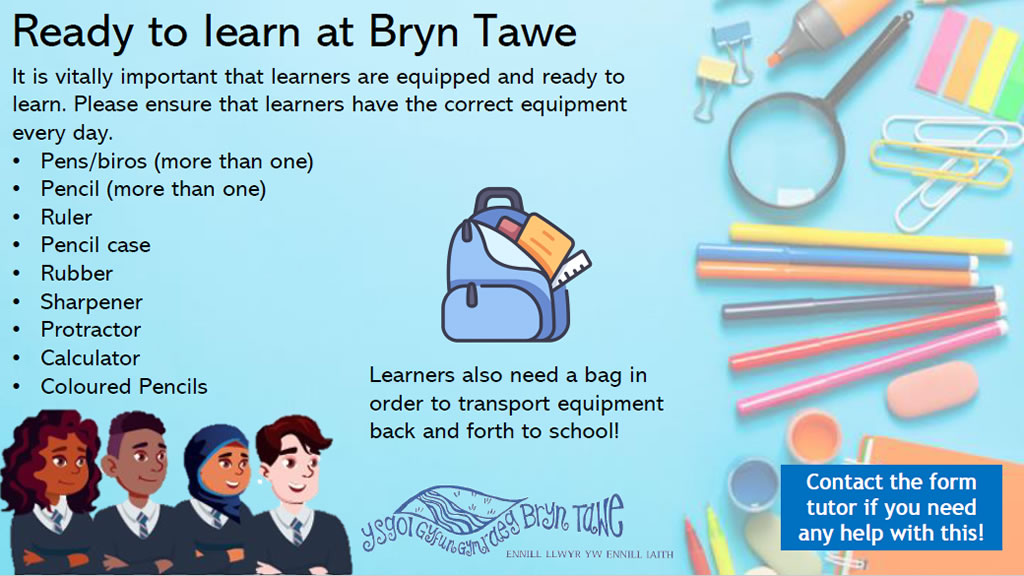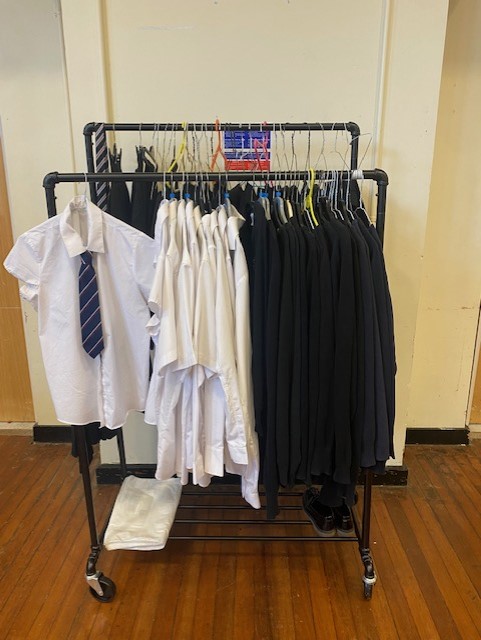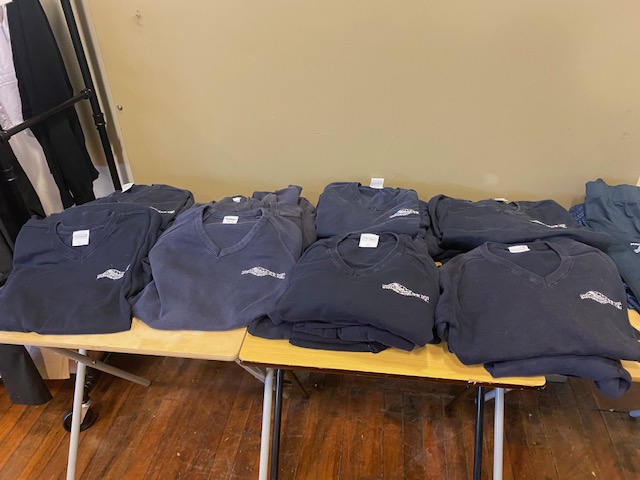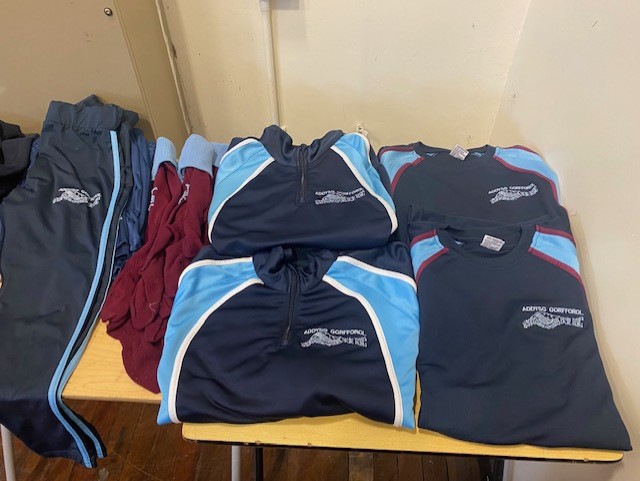Parent Information
- Letters 2023-24
- Letters 2022-23
- Ready to Learn
- Revision Support
- Literacy Support
- Careers Information
- Uniform
- Mobile Phone Policy
- Downloads
- Attendance
- Pupil Deprivation Grant
Letters 2023/24
CY Llythyron 2023/24Letters 2022/23
CY Llythyron 2022/23
Ready to Learn
CY Barod i Ddysgu
It is vitally important that learners are equipped and ready to learn. Please ensure that learners have the correct equipment every day.
- Pens/biros (more than one)
- Pencil (more than one)
- Ruler
- Pencil case
- Rubber
- Sharpener
- Protractor
- Calculator
- Coloured Pencils
Learners also need a bag in order to transport equipment back and forth to school!
Contact the form tutor if you need any help with this!
Revision Support
CY Cefnogaeth Adolygu- Striving for Success (Revision Guidance)
- Revision Techniques
- Exam Countdown How can students revise effectively?
- How can students revise effectively?
- Flash Cards
- 10 ways to motivate learners at home
- 10 tips to prepare for your first exam
- 10 common mistakes students make
- 9 ways to use retrieval practice
- 9 Ways to Beat Revision Stress
- 7 tips for better concentration
- 6 reasons why exams are important
- 6 reasons to put your phone away
- 5 ways to organise your work space
Literacy Support
September 2023
Homework will be noted bilingually on ‘Satchel’.

Need support to translate a worksheet? Use ‘Google Translate App’. Open the app. Press the camera button above a worksheet/computer screen and the app will translate the words.

School Uniform
CY Gwisg ysgolThe official school uniform gives our pupils as members of Ysgol Gyfun Gymraeg Bryn Tawe the opportunity to be proud of their school, giving them a sense of belonging and to be prepared to maintain high standards of behaviour and commitment to the work and aims of the school. We have high expectations in terms of uniform and every pupil is expected to conform to these rules.
Official School Uniform - Boys & Girls
- Plain black shoes. Trousers must cover any plain black ‘boots’ worn. Heels over 4cm are not permitted.
- Plain dark socks or black tights without a pattern.
- Plain black trousers. Jeans (including skinny jeans) cords, skinny lycra trousers or combat trousers of any kind are not permitted.
- Plain black knee length skirt. Tight elasticated skirts are not permitted.
- Long sleeve white shirt with school tie
- Official school jumper (to go with the shirt & tie)
- Plain black or navy coat. Leather or imitation leather coats are not permitted.
Official Physical Education uniform - Boys & Girls
- Suitable training shoes or rugby/football boots.
- Official school socks, maroon with sky blue stripe/white training socks.
- Football shorts/rugby shorts navy with school logo or skirt woth school logo
- Official school sweat trousers.
- Navy blue t-shirt with school logo.
- Official school rugby shirt, maroon and light blue with school logo or PE maroon jumper with school logo
Appearance expectations
Jewellery
Only the following is acceptable: a wrist watch, one pair of plain studs at the bottom of the ear, one plain ring on one finger. Jewellery is not permitted to be worn on any other part of the body for Health and Safety reasons.
Makeup
Pupils are not permitted to wear makeup, false eyelashes or fake tan. Nail varnish and nail extensions are not permitted.
Hair
Unnatural hair colour or extreme fashion styles are not permitted. The school will decide on what is extreme. An extreme style can include, shaved head, tramlines, dreadlocks, extensions etc.
Thick and or colourful hairbands / clips are not permitted – navy or plain black only.
The school decides what is acceptable in terms of uniform and appearance.
If pupils do not comply disciplinary action will follow.
Swop Shop
- Second hand school uniform items can be bought or swapped with an unwanted item.
- Open lunch time Fridays and during each parent's evening.
- Requests for second hand school uniform can also be made discreetly through your child's Head of Year.



Parents and carers: Information to support you child
As a parent or carer you play a key role in supporting your child to make decisions during their education journey and beyond. Find out about the Careers Wales team at Ysgol Bryn Tawe.
Careers Wales has new information and resources on their website to help you support your child.
Use their site to:
- Explore career ideas with your child;
- Help your child get the most from seeing an adviser;
- Find out about the curriculum and qualifications;
- Explore potential future jobs;
- Find out about different routes and pathways from school to work.
Click on the links above or visit parents and carers for more information.
Social media content:
Parents and carers! Do you need support with helping your child to make future career decisions?
@CareersWales has all of the information you need to be able to help them😊
Visit the dedicated parents pages on their website for support: Parents | Careers Wales (gov.wales)
#YourChildsCareerChoices
Parents and carers! Did you know that @CareersWales has a whole host of information, ideas and tools to help you support your child in making future career decisions?
Visit the dedicated parents’ pages on their website: Parents | Careers Wales (gov.wales)
#YourChildsCareerChoices
Whether your child is in primary school, secondary school, college, home-educated or taking their next steps after education, @CareersWales can help.
Visit the dedicated ‘parents’ pages on their website for support: Parents | Careers Wales (gov.wales)
#YourChildsCareerChoices

SCHOOL MOBILE PHONE POLICY
The impact of overuse of mobile phones and the time pupils spend in front of a screen is a growing concern due to the negative impact on learning and wellbeing. Mobile phones distract many learners during the school day. It is vitally important that learners can fully focus on their learning during lessons and spend quality time socialising together in their free time. In light of this, having consulted with our pupils, our parents' voice forum and school staff, we are going to implement some changes to our school mobile phone policy
.Therefore, learners will be permitted to:
- bring a mobile phone to school – however such devices MUST BE switched off (powered off) and out of sight during the school day (8:30am – 3:10pm)
- If learners need to use their mobile device for an essential reason – they must ask for permission from a member of staff.
- use their phone respectfully whilst travelling to and from school – i.e.. no photos / videos/ social media posts of other pupils, no online bullying/nasty messages, no loudspeakers etc
- use their phone during lessons with the permission of the member of staff – this will only be for educational purposes e.g. using websites or apps such as Kahoot; research purposes etc. Mobile phones MUST BE switched off again following such a lesson.
Learners will not be permitted to :
- use their mobile device without permission at any time during the school day (8:30am – 3:10pm)
- leave their device switched on(powered up) in their bag/pockets etc during the school day – this is due to notifications distracting learning and thuss having a negative effect on learning and wellbeing
- use headphones/speakers during the school day
Consequences
Any learner not following the steps outlined above during lessons will have their phone taken from them, and the device will be placed in a secure box until the end of the lesson – this will be recorded on SIMS (central school behaviour system).
Any learner not following the conditions above (outside of lessons) will have their mobile phone taken to the school office to be collected at the end of the school day.
Repeated offences will result in further consequences – e.g. parents being asked to collect the device, a suspension of the privilege to bring a phone to school.
Any more serious misuse of a phone (e.g. taking photos or videos during the school day, online bullying or hate messages etc) will result in more severe consequences and consultation with relevant authorities.
Concerns
We understand that some of the above may be a concern to you, but would also like to emphasise the challenges that we as a school regularly face due to mobile phones and their negative impact on learners’ education and wellbeing. Please see some answers below to queries/concerns that you may have:
FAQ’s
- I need to contact my child during the school day – how can I do that?
- We understand that parents may need to contact their child during the school day – we ask that parents phone the school office (01792 560600) and a message will be relayed to your child immediately. This may include a message for them to call you themselves.
- My child needs to contact me (parent) during the school day – how can they do that?
- We ask that any learner that needs to contact home asks permission from a member of staff before doing so. There is also a free to use ‘pupil phone’ in reception that learners can use to contact parents/carers if necessary. All parent/carer phone numbers should already be stored on our database.
- My child uses the Satchel app (previously Show My Homework) to view their timetable & homework – how will they manage now?
-
All learners will be given paper copies of their timetable at the start of the year – these should be glued into their contact books and kept safely. If any learner requires another copy – they can be obtained via the school office. All members of staff also have access to all learners’ timetables and can assist if required.
Learners should check/organise their homework before coming to school (ideally the evening before) – learners are not required to check/view homework during the school day – this should be done at home. - My child is not going to cope without their device being turned on
- Phone addiction and reliance is a growing concern for many of us, there will be times when young people and adults will have to go without their mobile phone for various reasons. We feel it is better to educate and support learners now, and at a younger age, before it becomes a more serious problem.
Parental support with this is vitally important and very much appreciated. There are many studies into the negative effects of screen time in regards to young people’s mental health, wellbeing and brain development and we feel it is our duty to take these important steps in an effort to support the wellbeing and learning of all pupils.
Downloads
CY Lawrlwythiadau- Your Guide to Welsh Medium Education
- A parent and carers guide to age ratings of apps and games
- Make time to read
- A revision guide for pupils and parents
Standard Forms
Attendance Policy
CY PresenoldebArticle 28 - Children and young people have the right to education no matter who they are.
Main principles
"If education is to be effective, regular attendance is a prerequisite, and ensuring this must be a priority for everyone in the school" (school attendance - The Education and Science Department, 1989)
Attendance is a statutory necessity for our pupils until they reach 16 years of age. Also, it's a necessity for earning a successful school career. Regular intermittent absences and/or absences for more extended periods are harmful to our pupils' education. Everyone involved in our pupils' education must work in partnership to ensure a high attendance amongst the pupils at Bryn Tawe.
Aims
Raising and maintaining attendance levels continues to be a priority in Bryn Tawe in order to provide the best opportunity for all pupils to reach their potential. There are several aspects of our daily work that have a positive effect on raising attendance:
- Implementing and monitoring clear registration systems
- Promoting and rewarding good attendance
- Monitoring and acting on low attendance - with a graduated response depending on the level of absence
- Expectations and support for parents
Implementing and monitoring clear registration systems
All members of staff who have a registration responsibility are aware of our processes with regards to ensuring that every pupil and student is registered present in order to meet Health and Safety requirements, as well as to ensure that we are able to monitor attendance correctly.
The attendance officer is responsible for the daily monitoring of every member of staff by ensuring they are fulfilling their registration duties for the morning and afternoon sessions. This is done centrally by 9:30 and 13:45.
Promoting and rewarding good attendance
In line with our rewarding policy, we often use prizes as a way of motivating pupils to be proud of their attendance in the school. For example:
- Merit points for good attendance are given every half term to pupils who
- achieve 95% or higher.
- Pupils who are present for 100% of the time during the Christmas term
- receive a merit certificate for their efforts. Similarly, pupils who are present 100% of the time receive various certificates
- Pupils also receive merit points that contribute towards their totals in order to win prizes in our reward ceremonies at the end of the Christmas and summer terms.
- We run attendance competition for the best classes every month.
- Every month, statistics are showcased for the best classes, the pupils who have achieved 100% attendance (100% Club) for the month as well as the whole school's statistics monthly in order to maintain the pupils' interest with regards to where we are with attendance.
Monitoring and acting on low attendance - with a graduated response depending on the level of absence
Some pupils are more likely to miss school than others - the reasons for this can include the following:
- The pupil's medical history
- Family tendencies
- Difficulties with access to the curriculum
- Bullying
- Friends
- School work
- Ill health
- Problems with regard to care or problems at home
- Transport to and from the school
- Work and money
In light of low attendance we have various graduated responses to overcome the problem. These include:
- Head of Key Stage to receive a printout of the pupils with a percentage under 90% from the Attendance Officer.
- Regular discussions between the Head of Key Stage and the welfare officer to discuss pupils with low attendance percentages
- Weekly meetings between the Head of Key Stage and the welfare officer to discuss specific pupils
- Regular interviews (every half term/4 weeks) for pupils with low percentages (under 90% - PT; under 85% Head of Key Stage; under 80% Welfare Officer)
- Interviews to monitor targets
- Meetings with parents of pupils who have a regular low %
- Targeting particular families
- Dedicated parents' evening for pupils with low attendance
- Referral to the Welfare Officer
- Meetings with the Senior Management Team
- Governors' committee meeting
- Refer the case to the court
The Head of Key Stage the Welfare Officer and members of the Senior Management Team will regularly discuss the most suitable steps for individual pupils in order to respond to their needs in the best way.
Expectations for our parents:
- Ensuring regular attendance of their children
- Work in partnership with the school
- Ensure that their children understand the importance of attendance
- Take an interest in their children's education - ask about their experiences in the school and encourage them to take part in extra-curricular activities in the school
- Discuss any possible problems their children are having in the school - contact the school's teacher or headteacher to discuss any serious incidents.
- Not to allow them to miss school for trivial reasons - especially reasons that parents wouldn't miss work for
- Organise appointments and visits after school, over the weekend or during school holidays as this is an effective way of helping to avoid disrupting the child's education in the school
- Not to take their children on holiday during school time
Support for parents:
- Your child's school is the first point of contact to discuss any attendance problems.
- The school should agree on an improvement plan to improve your child's attendance.
- Keeping in regular contact with the school is crucial.
- Every school has a Welfare Officer who can offer support with regards to problems that involve attendance.
- They can offer specialist help to improve your child's attendance and behaviour whilst at the school.
- The Welfare Officer will work with families and schools to avoid serious problems such as bullying.
- Support is offered to reduce the burden on pupils who find things difficult on different occasions (i.e. if a child spends a lot of time caring for another member of the family).
- Support because of a long-term illness.
- Make sure that your child goes to school regularly, arrives on time and attends every lesson.
- Start developing these routines from a young age. If you feel that your child is having problems, speak with the teachers at the school.
- Contact your child's school as soon as you start to feel worried about your child's attendance.
- Being absent means that your child is missing out on important learning opportunities.
- Punctuality and regular attendance will help your child to develop two valuable aspects in the eyes of an employer, which are reliability and self-organisation.
Penalty Notice Information regarding school absences
The Education (Penalty Notices) (Wales) Regulations 2013 introduced fixed notice penalties for regular non-attendance at school.
The Welsh Government has required all local authorities to draw up and implement their own Local Codes of Conduct to ensure consistency in the issuing of penalty notices. The code will be implemented in Swansea from January, 2015.
The Welsh Government states that penalty notices are one option among a number of different interventions available to promote better school attendance. The introduction of these regulations is one part of the Welsh Government strategy to support improved school attendance across Wales.
The introduction of these regulations mean that parents may now be fined for their child(ren)’s regular non-attendance at school.
The local code of conduct, which explains how penalty notices will operate, is available on the Swansea Council website https://www.swansea.gov.uk/educationpenalty
On the website the local authority has also provided answers to some frequently asked questions. Parents/carers will also receive explanatory letters and information leaflets from their child’s school in January, 2015.
If any parent has concerns about their child/s attendance, then please speak to staff in school for advice and support.
Pupil Deprivation Grant (PDG)
CY Grant Amddifadedd DisgyblionBackground
| 2020 | 2019 | 2018 | |
|---|---|---|---|
| Pupils at Bryn Tawe at the beginning of September | 888 | 859 | 821 |
| % of pupils eligible for free school meals | Over 14% | Over 12% | 12% |
| Pupil Deprivation Grant | £110,000 (4/2020-3/2021) |
£69,000 (4/2019-3/2020) |
£64,400 (4/2018-3/2019) |
Notes 2018/2019/2020
The Pupil Deprivation Grant (PDG) is directly linked to the number of pupils who receive free school meals (FSM) at the school. Any expenditure from the grant is aimed at raising the standards of pupils who are at risk of underachieving because of poverty and deprivation.
The Sutton Trust is a charitable organization that investigates the effect of additional support aimed at raising the standards of pupils who are at risk of underachieving because of poverty and deprivation. Ysgol Gyfun Gymraeg Bryn Tawe has adopted a range of strategies recognized by the Sutton Trust as strategies that reinforce the school's aims.
The school has used a wide variety of strategies, specifically to support pupils who face the challenge of poverty and deprivation, including:
- Appointing a Literacy (Welsh and English) and Numeracy Assistant to design and distribute programmes and activities for targeted pupils including pupils who receive or are eligible to receive FSM.
- Developing leaders to promote pedagogy and ensure effective staff development within the school. The aim is to ensure that all staff understand the need to overcome the barriers faced by our pupils within society. Specific INSET sessions are held on improving the quality of teaching in these aspects annually.
- Releasing 3 members of staff (pastoral leader, KS3 and 4 class teachers) to plan and monitor an intensive mentoring programme with specific interventions to support pupils, including pupils who receive or are eligible to receive FSM, to raise standards in all key stages.
- All members of staff to prepare a robust mentoring programme to support our pupils' academic progress, including pupils who receive or are eligible to receive FSM, to raise standards in all key stages.
- Releasing KS3 Literacy (Welsh and English) and Numeracy Co-ordinators, who are experienced teachers, to work with specific groups of pupils on intervention strategies for literacy and numeracy.
- We have designated an additional learning class in Mathematics, English and Welsh so that we can develop a number of smaller classes. The classes include a number of pupils who are at risk of underachieving because of poverty and deprivation and we therefore expect them to realize their potential.
- Close collaboration with our primary partner schools on agreed strategies to raise our pupils' literacy and numeracy standards.
- We have identified a group of KS4 pupils who are at risk of being Not in Education, Employment or Training (NEET) when they leave school at 16. The majority of these pupils are at risk of underachieving because of poverty and deprivation. They receive regular mentoring sessions to support them to cope with the requirements of various courses, as well as encouraging them to raise their motivation levels to succeed academically.
- Providing the 'Improvement Room', which is an additional inclusion area to allow pupils with behavioural and emotional needs to receive additional support to succeed.
- Financial support for FSM pupils to attend extracurricular courses and music lessons to ensure participation in order to raise standards.
- Funding an 'Inclusion Officer' in order to provide a very successful inclusion resource which plays a key part in providing continuity in the education of our more vulnerable pupils.
- We monitor attendance closely, and introduce a wide variety of strategies which include targeting specific pupils who are at risk of underachieving because of poverty and deprivation.
The school's PDG and EIG plans are regularly appraised by the Local Authority.




